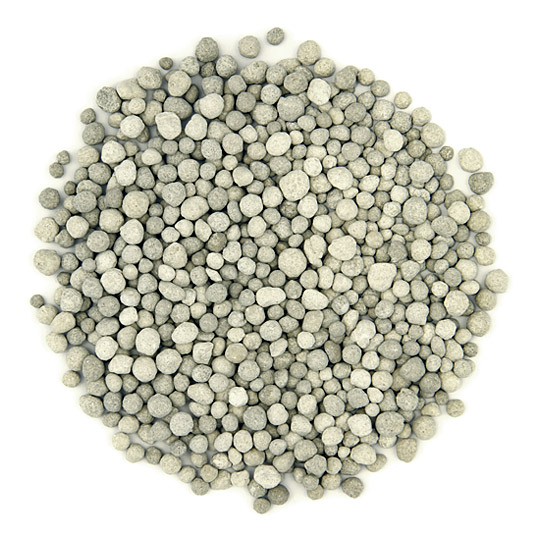Triple Superphosphate (TSP)

Technical specification
Triple superphosphate is highly concentrated phosphorus fertilizer with contents of 46% diphosphorus pentoxide (P2O5). It is appropriate for feeding all the types of soils which have рН within the limits of weakly acidic to alkaline medium.
It assists the acceleration of the growth and the development of the root system, increases the resistance of the plants to freezing, helps for the full absorption of the soil moisture, and in this manner it reduces the probability of damages to the plants in time periods of drought. In combination with nitrogen fertilizers in a balanced formulation it assists the absorption also of other nourishing elements of the plant.
The time periods during which the triple superphosphate is applied are predominantly as stocking autumn fertilization, as it is a slowly acting fertilizer. The gradual delivery of the active substance is due to the technology of production itself and the fact that the basic raw materials are phosphorus ores. They determine the contents of various forms, which phosphorus is in the product in. Certain conditions of the medium are required for the decomposition of phosphorus in the soil to forms, which are easily absorbable for the plants. Water-soluble phosphorus is the most accessible for the crops and the remaining forms contained in it must pass through various processes to reach these forms. Due to the water-soluble phosphorus, which the phosphorus is connected in the fertilizer in, it may provide for momentary satisfaction of the needs of the plants of phosphoric food, the remaining forms continue to deliver an active substance for a longer time period. This quality makes it very effective for agriculture because of its prolonged action.
It is not hygroscopic and it has a granular form with equal in size granules which makes its application through fertilizer spreading equipment very precise.
It is ratified as a product in the technology for growing arable crops as well as for perennials. In combination with nitrogen fertilizers (ammonium nitrate, liquid nitrogen fertilizer, urea and so on), triple superphosphate is very successfully applied in the development of fertilizer programs.
Advantages
- It accelerates the growth of the root system of the young plants;
- It shortens the time period of youthful infertility of young grape vines and fruit crops, it accelerates the florescence and the ripening of the fruits;
- It increases the resistance of the plants to freezing and drought;
- It performs a decisive role for the formation of the quality of the production of cereals, vegetable, fruit, technical and oil-bearing crops;
- It eliminates the negative influence of one-sided nitrogen fertilization;
- Plants derive most phosphorus from the soil in the middle of their vegetation when the main volume of vegetative mass is formed and the production is created.
The following is observed if there is no sufficient phosphorus in plants:
- Weak and abnormally developed root system;
- Small-sized and curled at edges blue-green or green leaves with bronze or violet shade;
- The development, florescence and ripening of the fruits are inhibited;
- Low resistance to frost and cold;
- Intensely reduced yield of poor quality.
Customs tariff number
3103110000
Technical characteristics
| PARAMETER | NORM | Harmonized analytical standard | |||||
| Total Phosphorous pentaoxide (Р2О5), % | 47,0 ± 2,0 | BDS EN 15956; BDS EN 15959 | |||||
| Phosphorous pentaoxide (Р2О5), soluble in neutral ammonium citrate, % | 44,0 ± 2.0 | BDS EN 15957; BDS EN 15959 | |||||
| Phosphorous pentaoxide (Р2О5), soluble in water, % | 42,0 ± 2.0 | BDS EN 15958; BDS EN 15959 | |||||
| Phosphorous pentaoxide (Р2О5), soluble in neutral ammonium citrate and water*, % | 45.5 ± 2.0 | BDS 14131, amm. 2; BDS EN 15959 | |||||
| Free Phosphoric acid* (Р2О5), % | max 4.0 | BDS 14131, p. 4.3 | |||||
| Content of Water*, % | max 4.0 | BDS EN 12048 | |||||
| Cadmium (Cd)*, mg/kg Р2О5 | max 60 | BDS EN 16319 + А1 | |||||
| Hexavalent Chromium (Cr VI)*, mg/kg dry matter | max 2 | BDS EN 16318 + А1 | |||||
| Mercury (Hg)*, mg/kg dry matter | max 1 | BDS EN 16320 + А1 | |||||
| Nickel (Ni)*, mg/kg dry matter | max 100 | BDS EN 16319 + А1 | |||||
| Lead (Pb)*, mg/kg dry matter | max 120 | BDS EN 16319 + А1 | |||||
| Arsenic (As)*, mg/kg dry matter | max 40 | BDS EN 16317 + А1 | |||||
| Granulometry: granules 1-5 mm | min 98 | BDS EN 1235 | |||||
* Parameters are not required for labeling according to Regulation 2019/1009 of EU fertilizing products. Determined at request and once / 3 months.